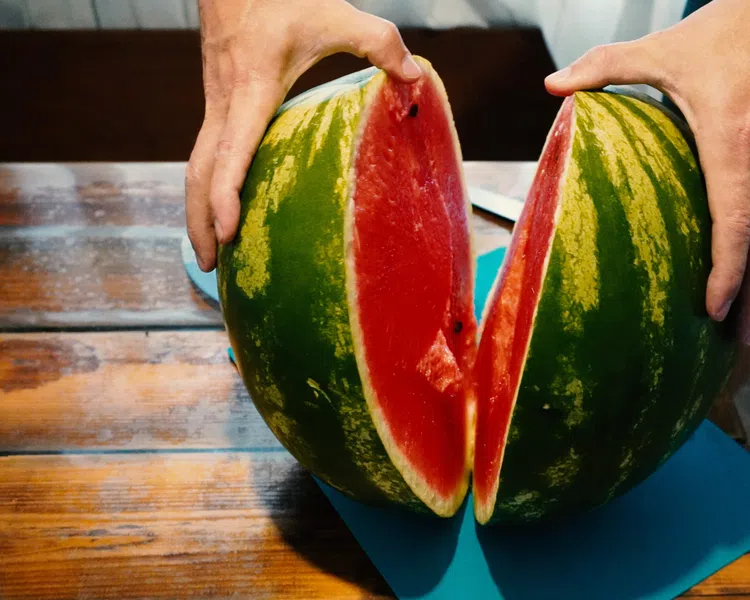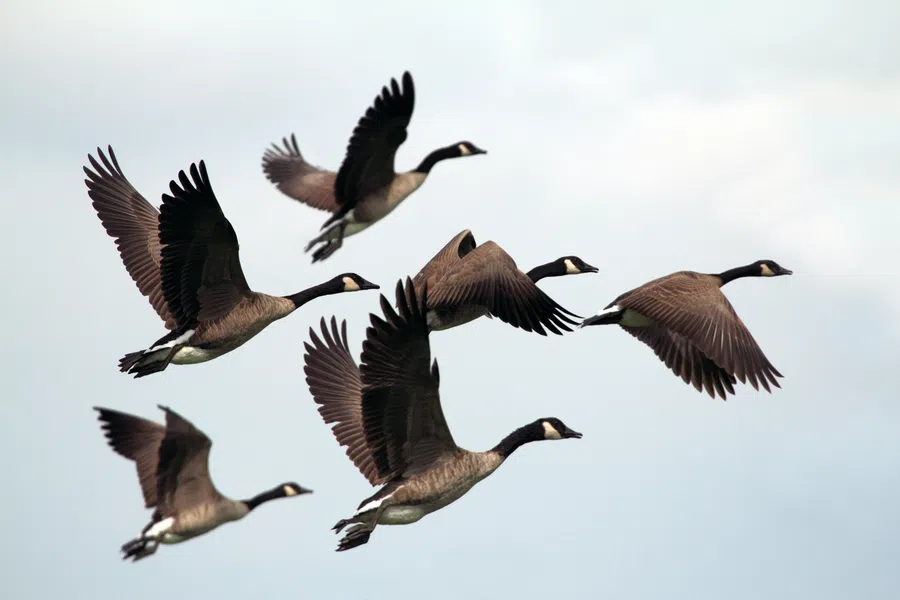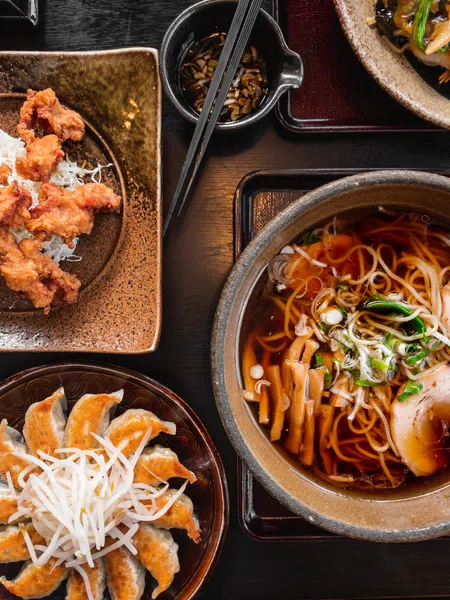"Geese" Summary
When Dina moves from Baltimore to Tokyo, she tells her neighbors she's leaving to make a lot of money in Japan before settling down. They think she's crazy, but Dina fell in love with the idea of Japan when she had her first taste of Japanese food at 20 years old.
In Tokyo, Dina struggles to find a job. She feels like an outcast as both an American and a Black woman. She learns Japanese companies prefer to hire Japanese workers. Even with her visa, the best job she can get is working at an Americanized amusement park.
Dina meets her first friend, Arillano Justinio Arroyo, working at the amusement park. Ari is from another Asian country, but he, like Dina, is a foreigner in Japan. When summer ends, both Ari and Dina move on. Ari finds a new job, but Dina's visa has expired and she can't find work. She decides to explore Tokyo like a tourist, visiting places she can't afford and buying authentic Japanese food. She sells her return plane ticket and spends her nights in a hostel she rents from month to month. Dina takes the subway every day, bumping into Japanese businessmen who call her sexy and view her dark skin as exotic.

Fig. 1: Dina operates a teacup ride at an amusement park; it is the only place that will hire her.
Eventually, Dina's money runs out, and she can no longer afford to pay to stay at the hostel. She meets with Ari, hoping to find leads on a job (she doesn't), and he eventually offers to let her live with him out of pity. Shortly after Dina moves into the one-room flat, Ari comes home with Petra, another foreigner looking for refuge in Tokyo.
Petra is from Moldova, where she once made a fortune from modeling. Petra's career was ruined, however, when a freak accident with an escalator left her face broken and scarred. Petra refuses to go back to Moldova or find work in Japan. Shortly after Petra moves in with Ari and Dina, her Hungarian boyfriend, Zoltan, follows her.
Petra tells Dina she plans to go to the United States where the doctors will fix her face and she can model again. Both women realize that is a lie Petra tells to deceive herself.
Zoltan acts like he's just visiting at first, but he never leaves. Ari and Dina quickly learn that Zoltan and Petra have a turbulent relationship. Their fights are physically dangerous, followed by passionate sex that shakes the entire flat. Zoltan, like Petra, doesn't search for a job and spends much of his time pining over the glory of his past life. He was once a bodybuilder, but his body has been beaten down by hunger.
One day, Ari comes home with a Moroccan man named Sayeed. Sayeed was disowned by his family and community when he married a foreigner instead of the Moroccan woman his family had arranged for him to wed. Sayeed moved to Japan, hoping to start a business after his wife left him. He never received the funds he was promised and, like the others, has no job prospects in Japan.
Sayeed takes his anger out on Dina, pulling a knife on her while she's sleeping one night. Zoltan and Petra do nothing while Ari takes Sayeed out of the room and talks to him. Despite wanting to get out, Dina can't find a job anywhere.
The neighbors gossip about the five foreigners living in the flat while their money dwindles. With only Ari bringing in money, the others steal food to survive. Petra is the best at it, pretending to be pregnant by stuffing groceries into her shirt. Her ruse is caught, however, and one by one all of the shops become suspicious of foreigners. Dina, Petra, Zoltan, and Sayeed can no longer steal in their community. With no money to travel to a new city to steal, they slowly starve.

Fig. 2: Petra is caught when a watermelon she is stealing falls out of her shirt and smashes on the ground.
One day, Ari comes home and tells everyone he has lost his job. They take a meager picnic of cheese, paprika, plums, and crackers to the park, where Japanese families are lounging and enjoying themselves. Zoltan chases a group of geese, and Dina imagines him catching one, breaking its neck, and taking it home to eat. The geese fly away, and the Japanese families in the park laugh at the foreigners like they're a source of amusement.
A week after seeing the geese in the park, Ari cuts up the last bit of food in the flat—a banana and a grapefruit—into six pieces. Each eats their portion. When only one piece of grapefruit and one piece of banana is left, Dina asks if anyone else is going to eat it. No one else says anything, so she eats it. Dina can tell immediately she has messed up. She goes to the subway and makes a scene until the lady at the booth is forced to let her on the train without paying for a ticket.
On the train, Dina eventually finds a Japanese businessman. He tells her she is sexy, and she follows him back to a hotel. After the two have sex, the businessman gives her a wad of money, and she gets back on the train. The train passes a park, where Dina sees geese take off and fly in formation. She thinks of kamikaze pilots, who know they are flying off to their death but do it anyway. She wryly thinks back to her youth, when she thought life would be much different.

Fig. 3: Dina thinks of Japanese kamikazes and self-destruction when she watches a flock of geese flying.
"Geese" Characters
The list below contains the most important characters in "Geese" and their role in the story.
| Character | Description |
| Dina | A young African American, Dina moves to Japan after falling in love with the culture. She struggles to find a job or fit into Japanese society. She moves in with her friend Ari when she runs out of money. They are later joined by three other foreigners living in Japan. Eventually, poverty and lack of opportunities wear Dina down, forcing her to have sex with a wealthy Japanese man to save her friends and herself from starvation. |
| Arillano Justinio Arroyo | Dina's first friend in Japan, Arillano (Ari) Justinio Arroyo is from an Asian country but feels out of place in Japan. He first meets Dina while they're both working at an amusement park. Ari has a soft spot for foreigners who can't help themselves and takes four people into his flat. He provides for them as the sole source of income, but Ari becomes increasingly worn down and overwhelmed by his responsibilities. |
| Petra | Petra is a former model from Moldova. She fled the country in disgrace after an accident ruined her face and forced her to stop modeling. Petra refuses to work in Japan, and Ari invites her to move in with him and Dina to help support her. She is in a tempestuous relationship with Zoltan and cries when she faces the slightest adversity. |
| Zoltan | A former bodybuilder from Hungary, Zoltan follows his girlfriend, Petra, to Japan. They are in a passionate but toxic relationship, and he burns himself during one of their fights. Zoltan doesn't try to find a job, instead lamenting the loss of his glory days. He does not get involved when Sayeed tries to kill Dina and only seems to care about Petra. |
| Sayeed | Sayeed left Morocco in disgrace when he refused an arranged marriage and married a non-Moroccan woman. She left him, and he is now bitter and jobless in Japan. Sayeed uses Dina as a scapegoat and tries to kill her one night. |
"Geese" Characteristics and Analysis
The main symbols in "Geese" are food and geese.
Food
Food is a powerful symbol that initially represents luxury and indulgence but soon comes to symbolize the struggle for survival. For Dina, eating Japanese food for the first time is a turning point in her life as
...she'd marveled at the sashimi resting on its bed of rice, rice that lay on a lacquered dish the color of green tea."
It was then that Dina decided she wanted to move to Japan and experience the luxury and indulgence of Japanese culture. Even when she is unsuccessful in finding a job and supporting herself, she stays and vacations the city like a tourist, enchanted by Japanese culture and food: "she ate an outrageously expensive bento lunch under the Asahi brewery's giant sperm-shaped modernist sculpture."

Fig. 4: Dina once thought of food as a symbol of luxury, but it soon becomes a symbol of scarcity and need.
But the food that once symbolized luxury and the height of Japanese culture quickly becomes a symbol of scarcity and struggle. Each of the five roommates share an equal portion of their meager rations, and "Since they had nothing left to eat, they smoked." As the days pass with only Ari holding a job, the ramen and crackers begin to fade. Soon, Dina finds herself
...eye(ing) a cellophane Popsicle wrapper nestled up against a ginkgo. It was gaudily beautiful with its stripes of orange ooze from where a kid had licked it."
The food that had once screamed of possibility is now a stark reminder of Dina's struggle to survive in a world of poverty and hunger.
Geese
The geese Dina and her other roommates encounter in the park are another major symbol in the short story. Although the foreigners don't realize it at first, the geese come to represent dehumanization and destruction.
With no money, all the foreigners can think of is food:
When Zoltan started the chase anew, Dina realized he was not after the crackers but the geese themselves. She imagined Zoltan grabbing one of the thin, long necks, breaking it with a deft turn of the wrist...everyone happily defeathering the bird, feathers lifting and floating then descending on their futons and blankets, the down like snow, the underfeathers like ash...They would make a game out of adjusting the oven dials, then wait out the hours as the roasted gamy smell of the goose made them stagger and salivate."
But instead of savagely catching a goose and feeding themselves, all the group manages to do is cause a scene and embarrass themselves in front of the Japanese families in the park. Compared to the Japanese families sunbathing and picnicking, Zoltan and the group appear barbaric and unsophisticated. The Japanese laugh at the foreigners, further contributing to the symbol of dehumanization.
Later, Dina watches the geese out the window of her train after prostituting herself for money. She realizes they look like Japanese kamikazes, which flew with the sole intent of dying to serve the emperor. In extension, the geese remind Dina of herself, willing to ruin herself if it means protecting her people. In addition to dehumanization, the geese become a symbol of self-destruction.
"Geese" Themes
The main themes in "Geese" are foreigners as social outsiders and sex as power and ruin.
Foreigners as Social Outsiders
When Dina decides to move to Tokyo, she is completely unaware of how difficult life in Japan will prove to be. From the beginning, she faces obstacles as an outsider in a foreign country. She can't find a reliable job because of prejudice against outsiders; without an income, she cannot buy food or rent. Even though Dina is capable and willing to work, she is met with resistance because of her identity as a foreigner. She is kept from working and truly engaging with Japanese culture, further deepening the divide between native Japanese people and foreigners.

Fig. 5: The foreigners are treated like outsiders and oddities in their Japanese society.
Dina, Petra, Zoltan, Ari, and Sayeed also become objects of entertainment because of their status as foreigners. Their neighbors constantly see them as the Other, a source of ridicule and amusement because they are so different. Dina notes their vague words thinly cover their blatant disdain for the foreigners:
They have a lot of people living there, don't they? meant Those foreigners! Can't they be quiet and leave us in peace! And I wonder if Roppongi would offer them more opportunities meant, They should go to Roppongi where their own kind live!"
Despite living in Japan for months, the foreigners are constantly kept on the margins of Japanese society.
Sex as Power and Ruin
The idea of sex as both power and ruin doesn't appear in earnest until the final few pages of the short story, although it is foreshadowed early on. When Dina first gets to Japan, she is disgusted when the old Japanese men "proposition" her after commenting on her body. She ignores them and goes about her life as usual.
That is, until she has no other options. After months of being unable to find work and Ari losing his job, Dina decides to use her body and have sex with Japanese men to keep herself and her roommates afloat. This gives her a sense of power, as she can finally make money and retake control of her life. It also brings her to emotional ruin, comparing herself to geese and Japanese kamikazes, who know they are headed towards certain destruction but fight for their cause anyway. Dina realizes she's just like the kamikazes, willing to sacrifice herself emotionally and morally if it means keeping her cause alive.
"Geese" Quotes
Below are some of the most important quotes in "Geese."
...it wasn't really a plan at all, but a feeling, a nebulous fluffy thing that had started in her chest, spread over her heart like a fog. It was sparked by movies in which she'd seen Japanese people bowing ceremoniously...in the end, she went to Japan for the delicate sake cups, resting in her hand like a blossom; she went to Japan for loveliness."
Dina uproots her entire life because of a romanticized and idealistic depiction of Japan she has been fed by American popular culture. She learns life in Japan is much more complicated than it is portrayed in the movies, and her dream has been a facade. In reality, Dina faces poverty, starvation, and physical violence during her time as a foreigner in Japan.
...she nodded as though she understood, though she felt she never would. Things simply made all of them cry and sigh. Things dredged from the bottom of their souls brought them pain at the strangest moments.
Each of the characters in the short story is haunted by the ghosts of their pasts. Whether it be trauma, failure, or loss, each secretly shoulders their pain. Although Dina lives with the other foreigners, she realizes she will never truly be able to understand them, and they will never know her. Dina is emotionally isolated in Japan.
The book told of kamikaze pilots, flying off to their suicide missions... She remembered how she'd marveled when she read it, amazed that anyone would do such a thing; how—in the all-knowing arrogance of youth—she'd been certain that given the same circumstances, she would have done something different."
Dina reflects on the human capacity for self-destruction. She never thought she would have been willing to ruin herself for others until her reputation is on the line.
Geese - Key takeaways
- "Geese" was written by ZZ Packer and first published in her 2003 short story collection Drinking Coffee Elsewhere.
- The short story follows an African American woman who travels to Japan alone in the hopes of experiencing the beautiful culture she has seen in movies; she ultimately realizes the dream is unachievable as Japanese culture is hostile to foreigners.
- The other characters in the short story are Ari, Petra, Zoltan, and Sayeed.
- The main symbols are food (luxury and scarcity) and geese (dehumanization and self-destruction).
- The main themes in "Geese" are foreigners as social outsiders and sex as both power and ruin.
Similar topics in English Literature
Related topics to American Short Fiction












